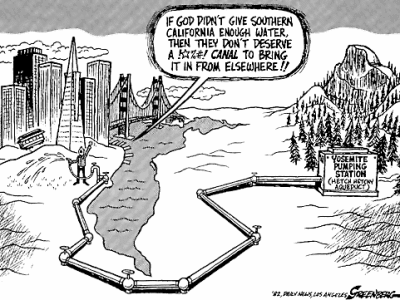2014 Senate Races and the Environment: Alaska and Colorado
Two anti-environmental Republicans versus a moderate and an environmental advocate.
Alaska and Colorado may both think of themselves as having a link to the frontier, but they're also very different in terms of demographics and dependence on the oil industry. The Senate races in the two states are also similar in some ways but not others, perhaps reflecting the more diverse economy of Colorado. In both cases, the Republican candidates are have anti-environmental records. The difference is on the Democratic side, where the Alaskan candidate has a mi...
CONTINUE READINGHuman Fingerprints on Australia’s Record Heatwave
Australia -- or at least Australia's current government -- downplays the danger of climate change. But, as a famous physicist once said, "reality must take precedence over public relations, for nature cannot be fooled." Last summer in Australia (corresponding to the winter months up here) broke many, many records. it was the hottest summer on record, contained the hottest month, and also the hottest day in Australian history. Now, the NY Times reports, five i...
CONTINUE READINGThe Greening of Post-Apocalypticism?
David Mitchell's Masterpiece Provides a Perfect Epigraph -- and Epitaph -- for Environmentalism
A few weeks ago, I finished reading David Mitchell's magnificent Cloud Atlas, a few months after seeing the still-excellent but-not-as-magnificent movie based upon it. The novel comprises a series of linked stories ranging from the mid-19th century to a post-apocalyptic future 300 years in the future. And that last story, profound and heartbreaking, tells us something interesting about contemporary environmentalism. When I was growing up, post-apocalyptic literature w...
CONTINUE READINGReflections on My Climate Ride for UCLA’s Emmett Institute
I've just returned from completing the Climate Ride from New York City to Washington this week, on behalf of UCLA’s Emmett Institute on Climate Change and the Environment. As Ann posted earlier, funds raised through the ride benefit the Emmett Institute and Dan Emmett is generously matching, dollar for dollar, every contribution up to $50,000. The experience was an amazing one that I thought worth sharing. The ride was beautiful, hard, and moving. Five days, thr...
CONTINUE READINGBay Area Tries to Screw the Poor
It's bad enough when folks from the Bay Area pretend that they are smarter and more sophisticated than everyone else. It's bad enough that they trash southern California (inaccurately) for "stealing" its water from the Owens Valley while enjoying water from the Hetch Hetchy Reservoir. But trying to undermine environmental justice while pretending to be progressive is going too far: Bay Area public officials are challenging a state plan to spend hundreds of millions o...
CONTINUE READINGWhat’s a March FOR?
Increase Your Intensity
With all the coverage that the huge (400,000 person) People's Climate March has received in the media, we still have to ask: what is a march for? How exactly does it fit into a coherent political strategy to combat global warming? You might say that by pointing to the media coverage, I have answered the question. But media coverage is not a goal. It is a method, which brings us back to the original question. A method for what? The theory of social movements seems to b...
CONTINUE READINGTwo Voices from the UN Climate Summit Today
A President and a poet on our climate future
If you want a sense of the tone of today's UN climate summit in NY, check out the remarks by President Obama (pasted below in full) and this remarkable poem, composed and read to the General Assembly today by Kathy Jenil Kajiner of the Marshall Islands. Ms. Kajiner was selected as a key speaker from civil society to the summit, and apparently she brought the house down. The contrast in remarks reminds me of a quote from another cerebral Democrat, Mario Cuomo, ackno...
CONTINUE READINGGuest Blogger David Schraub: Vermont Environmentalists File FTC Challenge over “Double-Counting” RECs
David Schraub is the Darling Foundation Fellow in Public Law at the University of California Berkeley School of Law. Represented by Patrick A. Parenteau and Douglas A. Ruley of the Vermont Law School’s Environmental and Natural Resources Law Clinic, four Vermont residents have petitioned the FTC to investigate alleged misleading marketing practices by Green Mountain Power regarding their provision of renewable energy. The petition contends that Green Mountain has en...
CONTINUE READING2014 Senate Races and the Environment: Georgia and North Carolina
Two GOP candidates: a cipher on environmental issues and a Romney clone.
Last week, I looked at the Republican Senate candidates in the neighboring states of Arkansas and Louisiana. This week, we turn to two other Southern neighbors, Georgia and North Carolina. (Before you rush to email me that they're not neighbors because South Carolina is between them, take another look at the map -- Georgia and North Carolina actually do have a common border west of South Carolina.) The Republican candidate in David Perdue has kept nearly mum on env...
CONTINUE READINGClimate Ride Part of Big Climate Week
In addition to the remarkable turnout for the Climate March in New York City, this weekend also kicked off the NYC to DC Climate Ride, which left Manhattan on Saturday, September 20. The Emmett Institute has its very own rider with Professor Ted Parson pedaling the 300 miles in 5 days. He's concluding the ride on Wednesday and will be the featured speaker in Washington, D.C. at the conclusion of the ride. Dan and Rae Emmett, our extraordinary supporters, are match...
CONTINUE READING










